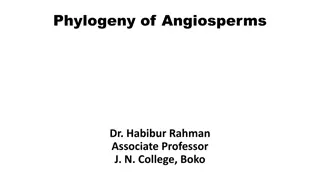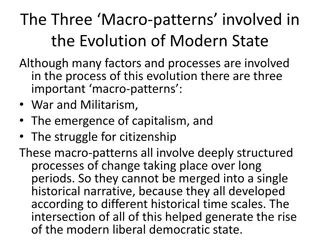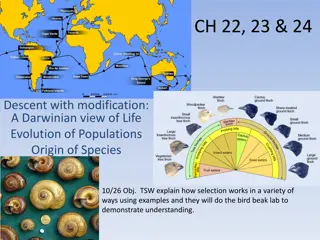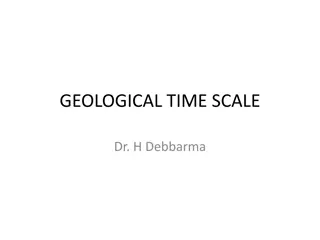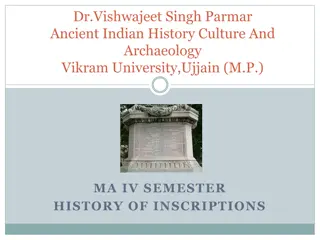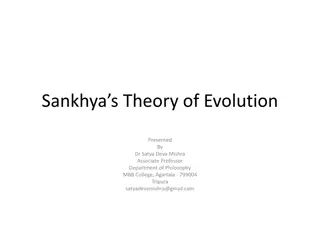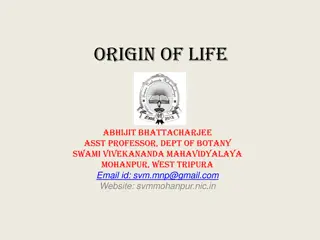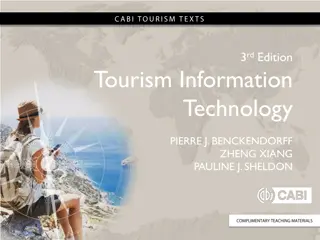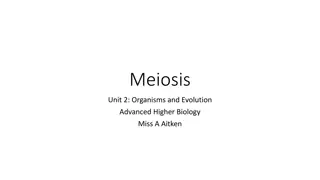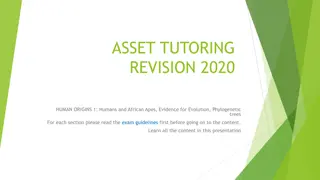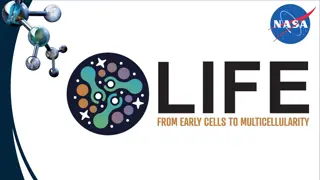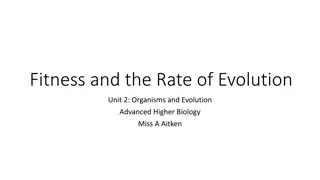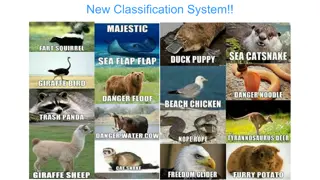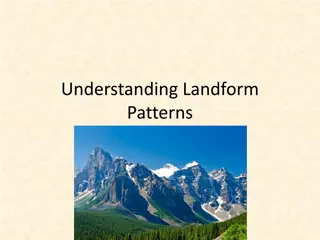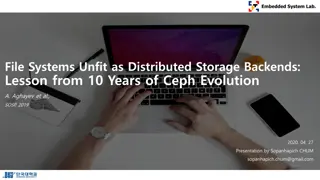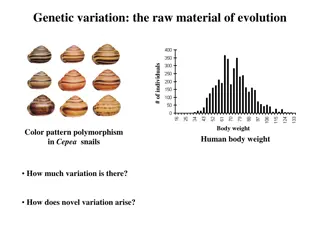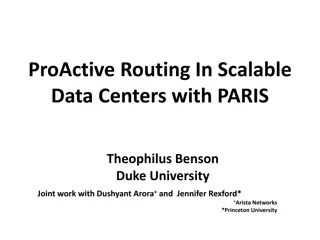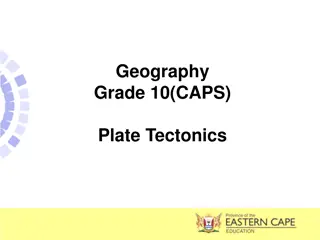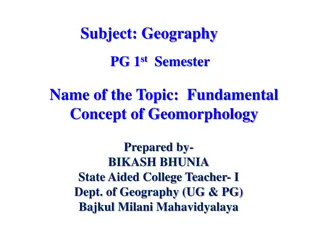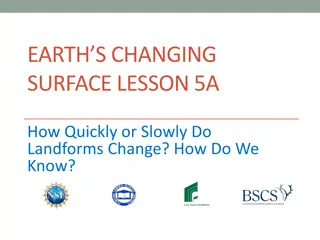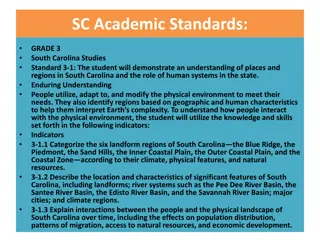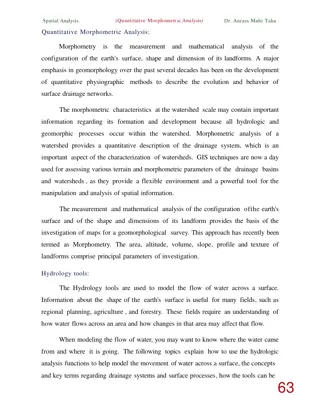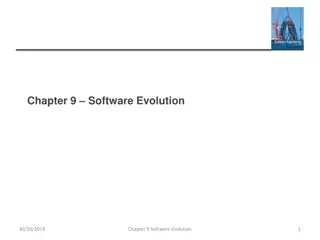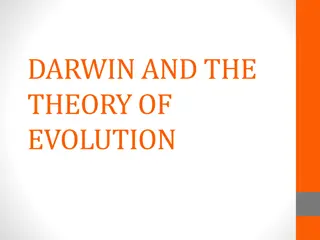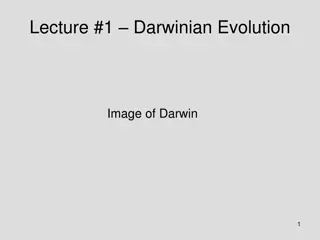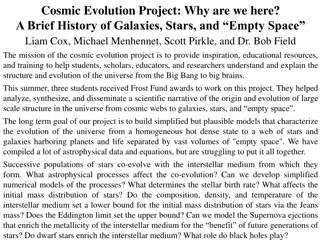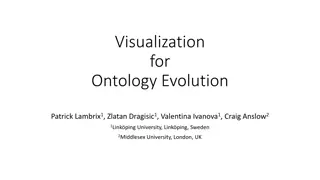Evolution and Plant Systematics Lecture Overview
This lecture outline delves into the concepts of evolution, unity, and diversity of organisms on Earth, covering topics such as fossils, Lamarck and Darwin's theories, adaptation, natural selection, artificial selection, Carolus Linnaeus' systematics, plant evolution, and the demonstration of evolut
5 views • 26 slides
Critique of Unilinear Cultural Evolution Models
The drawbacks of unilinear cultural evolution models are explored, focusing on the assumption that all cultures follow a single linear path of development. Issues such as the emphasis on material culture, overlooking of other cultural aspects, and the ethnocentric perspective towards Western culture
16 views • 17 slides
Understanding the Pace of Landform Changes
Exploring how landforms transform over time, this lesson delves into the speed at which geological features evolve. By comparing examples like the Grand Canyon and the Mississippi River delta, students learn how scientists collect data to determine the rate of change through measurements and photogr
5 views • 18 slides
Glacial Landforms: Rock Steps, Truncated Spurs, Hanging Valleys, and Crag & Tail
Explore the formation of unique glacial landforms such as rock steps, truncated spurs, hanging valleys, and crag & tail. Discover how glaciers sculpt these distinct features through processes like erosion and deposition, leaving behind stunning geological formations exemplified in locations like Ble
8 views • 43 slides
Understanding Phylogeny and Evolution in Angiosperms
Phylogeny is the study of evolutionary relationships among organisms, depicted in phylogenetic trees based on shared characteristics. This overview delves into terms like homology, analogy, monophyly, and co-evolution in angiosperms with an emphasis on taxonomy, systematics, and the evolutionary his
1 views • 25 slides
Evolution of Modern State: Three Macro-Patterns Explored
The evolution of the modern state is influenced by three key macro-patterns: War and Militarism, Emergence of Capitalism, and Struggle for Citizenship. These patterns involve deep processes of change over long periods, contributing to the development of modern liberal democratic states. War and Mili
0 views • 13 slides
Evolutionary Concepts and Natural Selection Explained
Descent with modification and natural selection play key roles in the process of evolution, as outlined by Darwinian principles. Through examples and historical context, the mechanisms of adaptation and survival of species are elucidated. The concept of variability within populations and the impact
0 views • 15 slides
Understanding the Geological Time Scale and Earth's Evolution
Studying the geological time scale is crucial for comprehending Earth's history, evolution of life, and significant events that shaped our planet. Evidences like field observations, fossil records, and radioactive dating contribute to constructing this vast timeline. Major occurrences such as mass e
1 views • 46 slides
Evolution of Inscriptions in Ancient Indian History
The evolution of inscriptions in ancient India reflects a shift from Prakrit to Sanskrit languages over the centuries, marking changes in content, purpose, and classification. Beginning with Brahmi inscriptions, the transition to Sanskrit gradually replaced Prakrit as the language of choice in North
0 views • 12 slides
Sankhya's Theory of Evolution Explained by Dr. Satya Deva Mishra
Explore the Sankhya philosophy's theory of evolution as presented by Dr. Satya Deva Mishra, covering concepts such as Prakrti, Purusa, theory of causation, evolutes of Prakrti, and the purpose of evolution towards liberation and self-realization.
2 views • 8 slides
Evolution and Impact of Wi-Fi Technology Trends
Discussion on the next generation Wi-Fi technology evolution, target objectives, and requirements aligning with market needs. The presentation covers the evolution of Wi-Fi technology based on requirements from 1997 to 2023, emphasizing the increasing importance of Wi-Fi due to global trends during
1 views • 14 slides
The Mysteries of Life: Origins, Evolution, and Plant Cells
The origins of life on Earth, spanning billions of years, continue to intrigue scientists. From the emergence of the Earth to the evolution of plant and animal life forms, the journey of life is a profound tale of adaptation and survival. Explore the fascinating hypothetical views on the origin of l
2 views • 14 slides
Evolution of Internet Technology in Tourism: A Comprehensive Study
Exploring the impact of the Internet on tourism, this study delves into topics such as historical evolution, Internet usage by travelers and organizations, search engine optimization, and web development for successful tourism sites. Key concepts like ISPs, servers, domains, and eCommerce are discus
0 views • 23 slides
Evolution of Liberal Citizenship Theory
The liberal theory of citizenship emphasizes the essential components of right, responsibility, and identity within a political community. It contrasts with pre-capitalist societies by offering a weak sense of membership and reduced citizen obligations. The addition of social rights has brought an e
0 views • 15 slides
Understanding Meiosis: Key Concepts in Biological Evolution
Meiosis is a crucial process in organisms, involving the formation of haploid gametes with unique allele combinations. This process ensures genetic diversity through crossing over and independent assortment, leading to variations essential for evolution. The significance of homologous chromosomes, d
1 views • 22 slides
Understanding Human Evolution: From Ancestral Lineage to Modern Hominids
Human evolution is a fascinating journey of change and development, where humans emerged as a distinct species. The theory of evolution highlights our common ancestry with other organisms, including chimpanzees. Evidence from fossils, genetics, and culture supports the idea of a shared ancestor amon
1 views • 23 slides
Exploring Human Origins: Evolution and Phylogenetic Trees
Delve into the fascinating realm of human origins through an examination of humans and African apes, evidence for evolution, and the construction of phylogenetic trees. Understand the relationships between species, common ancestors, and key evolutionary developments that have shaped the course of hu
4 views • 18 slides
Exploring Life-Planet Co-Evolution: Goals and Initiatives
A community dedicated to understanding the co-evolution of life and planet through rock records, biodiversity, genome databases, and modeling. Goals include unraveling major biological innovations and predicting life evolution on other worlds. Initiatives involve collaboration, outreach events, semi
1 views • 14 slides
Understanding Fitness and Evolution Rates in Organisms
Fitness in organisms is crucial for their survival in a given environment. Absolute fitness measures genotype frequencies between generations, while relative fitness compares genotypes to the most successful one. Factors like selection pressure can increase the rate of evolution by promoting benefic
0 views • 14 slides
Exploring the Evolution of Animal Classification
Unveil the fascinating world of animal classification with a new system, delving into the definition of animals, informal groups, key events in animal evolution like symmetry and germ layers, embryological development of protostomes and deuterostomes, tissues formation, body cavity types, and cephal
0 views • 34 slides
Evolution of Compact Star-Forming Galaxies and Quiescent Galaxies
The evolution of galaxies from compact star-forming to quiescent states involves processes such as secular evolution, gas inflows, and star formation quenching. By studying the structural relations and star formation in these galaxies, insights are gained into their transition towards quiescence. Th
0 views • 12 slides
Unveiling Earth's Landform Patterns Through History
Explore the fascinating journey of Earth's landforms, from the formation of continents to the theory of Plate Tectonics. Delve into the rich history of geology, uncovering insights from notable scientists like James Hutton and Alfred Wegener. Witness the dynamic processes of earthquakes, volcanoes,
0 views • 52 slides
The Scopes Monkey Trial: Clash of Cultures and Evolution Debate
Following World War I, the Scopes Monkey Trial in Tennessee marked a pivotal clash between urban and rural cultures over the teaching of evolution. The trial, prosecuted by William Jennings Bryan and defended by Clarence Darrow, resulted in teacher John Scopes being found guilty of violating the ant
0 views • 9 slides
Evolution of Insurance Markets
The content explores the evolution of insurance markets in different regions such as China, Japan, and India. It discusses topics like detariffication, market forces, regulatory interventions, historical underwriting results, and the impact of mergers and acquisitions on the industry. The evolution
0 views • 22 slides
Evolution of Ceph's Storage Backends: Lessons Learned
Embedded System Lab explores the challenges of building storage backends on local file systems, focusing on the evolution of Ceph's storage backend over a decade. The presentation delves into the complexities of distributed storage systems like Ceph, highlighting difficulties in leveraging efficient
0 views • 27 slides
Understanding Genetic Variation and Its Role in Evolution
Genetic variation is crucial for evolution, providing the raw material for adaptation and species diversity. Phenotypic variation can arise from differences in genotype, environment, or their interaction. Studying genetic variation through statistical analysis and at the molecular level helps us unr
0 views • 47 slides
Evolution of Data Center Networks Towards Scalable and Seamless Connectivity
Evolution of Data Center Networks highlights the need for networks in data centers to support diverse applications with high throughput and low latency, utilize multiple paths, and scale efficiently. The evolution from flat and hierarchical addressing to solutions like PARIS addresses issues such as
0 views • 30 slides
Understanding Plate Tectonics and Earth's Surface Features
The study of plate tectonics reveals how the Earth's crust is divided into tectonic plates, leading to various types of plate boundaries like divergent, convergent, and transform. These movements result in earthquakes, volcanic eruptions, and landform changes such as folding and faulting. Different
0 views • 15 slides
Rules and Practices for Software Evolution Support
This content focuses on the importance of rules and practices to support software evolution, addressing challenges, benefits, and impact on ecosystems. It emphasizes the need for system-specific rules, automatic extraction of conventions, and client support. The evolution of software is highlighted
0 views • 65 slides
Fundamental Concepts of Geomorphology: Exploring Earth Forms and Evolution
Geomorphology, derived from Greek roots for earth and study, focuses on the origin and evolution of Earth's surface features. Geomorphologists study landforms above sea level and the interface between solid Earth, Hydrosphere, atmosphere, and Lithosphere. The fundamental concepts of geomorphology in
0 views • 12 slides
Understanding Landform Changes Over Time
Explore the speed at which landforms change and how scientists gather data to track these transformations. Learn about examples like the Grand Canyon and the Mississippi River delta, and understand the role of flowing water in shaping landforms. Engage in activities to analyze the pace of change in
0 views • 13 slides
Understanding South Carolina's Geography and Human Systems
Explore South Carolina's diverse landform regions, river systems, major cities, and interactions between people and the physical landscape. Learn about the significance of Cheraw, Camden, Columbia, and North Augusta along the Fall Line and Sand Hills regions, as well as the Santee River and Edisto R
0 views • 8 slides
Quantitative Morphometric Analysis in Geomorphology
Quantitative morphometric analysis in geomorphology focuses on measuring and mathematically analyzing the earth's surface configuration and landform dimensions. It involves using GIS techniques to assess terrain parameters and drainage systems, providing valuable insights into watershed characterist
0 views • 8 slides
Software Evolution: Managing Change and Evolution in Organizational Systems
Software evolution is an essential process for organizations to maintain the value of their critical business assets. It involves adapting to new requirements, addressing errors, and enhancing performance. The majority of software budgets in large companies are dedicated to evolving existing systems
0 views • 61 slides
Darwin and the Theory of Evolution: A Comprehensive Overview
Darwin's Theory of Evolution encompasses the concepts of organisms changing over time and life evolving through natural selection. Influenced by scientists such as James Hutton, Jean Baptiste Lamarck, and Alfred Russel Wallace, Darwin's theory culminates in the idea of evolution by natural selection
0 views • 9 slides
Understanding Evolution: Key Concepts and Perspectives
Explore the concepts of Darwinian evolution, evidence for evolution, Darwin's theory, and the Modern Synthesis. Delve into the spiritual versus intellectual perspectives, the diversity of religious affiliations globally, and the compatibility of faith and science in understanding the natural world a
0 views • 91 slides
Unveiling the Cosmic Evolution: A Journey Through Galaxies, Stars, and Empty Space
Delve into the intricate story of the universe's evolution from its hot dense origins to the vast cosmic web of stars and galaxies. Explore questions on stellar birth rates, interstellar medium influences, and the role of dark energy. Follow the journey of three students working on the Cosmic Evolut
0 views • 30 slides
Understanding Evolution: Key Concepts and Perspectives
Explore the key concepts of Darwinian evolution, including evidence for evolution, Darwin's theory, and the Modern Synthesis. Reflect on the relationship between spiritual and intellectual perspectives, emphasizing that different ways of thinking can complement each other. Discover the diversity in
0 views • 91 slides
Visualizing Ontology Evolution for Improved Knowledge Management
Ontologies are dynamic entities that evolve over time, impacting semantically-enabled applications and knowledge acquisition. This work focuses on identifying desired functionalities for ontology evolution systems, highlighting the steps involved in ontology evolution, and emphasizing the importance
0 views • 16 slides
Evolution of Indo-European Languages through Phylogeny Estimation
Explore the evolution of Indo-European languages through phylogeny estimation under a model of linguistic character evolution. Follow the Computational Historical Linguistics Project's collaboration that began in 1994, leading to the development of methods and studies on homoplasy-free evolution and
0 views • 61 slides




